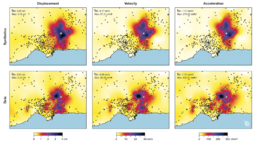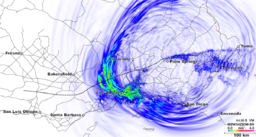High-F Project
The SCEC High Frequency (or “High-F”) project will integrate various scientific modeling and simulation efforts within the Southern California Earthquake Center (SCEC) with the objective of reproducing earthquake physics and effects at high frequencies (up to 10 Hz) using deterministic modeling approaches. The High-F project will use current forward wave-propagation simulation capabilities as a point of departure for improving current simulation methods and developing new modeling approaches in order to better reproduce the ground response at higher frequencies. The High-F project will incorporate high-frequency characteristics in the source representation and the structural heterogeneity of the seismic velocity models by considering aspects such as geometrical complexity of the faults, the random distributions of slip, rupture velocity, and rise time, and the stochastic characteristics of the material properties of near-surface layers. One, or more, historic earthquakes in Southern California will be selected as target events, and the results of high-frequency ground motion simulations will be compared with observed data from these earthquakes. The High-F project will help to define a reference framework for the evaluation of alternative simulation methods, such as the stochastic simulation methods developed within the SCEC Broadband Platform, and will seek to identify the threshold frequency at which deterministic and stochastic methods provide a viable tradeoff for hybrid approaches.
Contents
Recent High-F Simulations
High-F Backlog
References
- Cui, Y., Poyraz, E., Olsen, K.B., Zhou, J., Withers, K., Callaghan, S., Larkin, J., Guest, C., Choi, D., Chourasia, A., Shi, Z., Day, S.M., Maechling P.J., Jordan, T.J., Physics-based Seismic Hazard Analysis on Petascale Heterogeneous Supercomputers, Proceedings of SC13, (accepted for publication June 2013).
- Cui, Y., Olsen, K. B., Jordan, T. H., Lee, K., Zhou, J., Small, P., Roten, D., Ely, G., Panda, D. K., Chourasia, A., Levesque, J., Day, S. M., and Maechling, P. (2010) Scalable Earthquake Simulation on Petascale Supercomputers. In Proceedings of the 2010 ACM/IEEE International Conference for High Performance Computing, Networking, Storage and Analysis, doi=10.1109/SC.2010.45 (SC10 Gordon Bell Finalist).
- Graves, R., Jordan, T., Callaghan, S., Deelman, E., Field, E., Juve, G., Kesselman, C., Maechling, P., Mehta, G., Milner, K., Okaya, D., Small, P., Vahi, K. (2011), CyberShake: A Physics-Based Seismic Hazard Model for Southern California, Pure and Applied Geophysics, 2011-03-01, Pg.367-381, Vol: 168, Issue: 3, Issn: 0033-4553 Doi: 10.1007/s00024-010-0161-6
- Callaghan, S., Deelman, E., Gunter, D., Gideon Juve, Philip Maechling, Christopher Brooks, Karan Vahi, Kevin Milner, Robert Graves, Edward Field, David Okaya, Thomas Jordan (2010), Scaling up workflow-based applications, Journal of Computer and System Sciences, 76:6, pp. 428-446,September 2010.
- Bielak, J., R.W. Graves, K.B. Olsen, R. Taborda, L. Ramírez-Guzmán, S.M. Day, G.P. Ely, D. Roten, T.H. Jordan, P.J. Maechling, J. Urbanic, Y. Cui, G. Juve, “The ShakeOut earthquake scenario: Verification of three simulation sets,” Geophysical Journal International, 180(1):375–404, doi: 10.1111/j.1365-246X.2009.04417x, 2009.
High-F Planning Document
A High-F project planning document is under development by the SCEC CME group. The current draft version of this planning document is posted below.
- High-F Project Plan (*.pdf format)
- High-F Project Plan (*.docx format)

